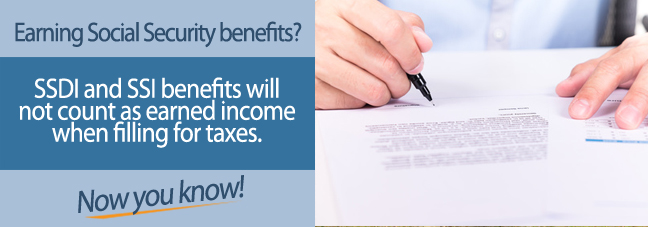If you are disabled, it’s likely that you are receiving Social Security disability benefits, either in the form of Supplemental Security Income, or Social Security Disability Insurance payments. These payments help a lot with expenses related to your disability, but how do you account for the extra income when tax season comes up?
The Social Security Administration and the IRS both have complex rules that can be hard to connect. When it comes to income taxes, you must consider what is considered gross income, and how Social Security disability benefits fit in.
IRS Rules: What Is Gross Income?
For IRS purposes, the important number you report is called your AGI, or adjusted gross income. This is the result when you combine all your taxable income, then subtract all deductions you are eligible for. Your total income consists of:
- Wages
- Interest
- Dividends
- Alimony
- Business income
- Capital gains
- Retirement distributions
- Unemployment compensation
- Social security benefits
Once you have combined all applicable income sources, you have your total income. Then, you will subtract tax deductions to determine your AGI. Common deductions are:
- Educator expenses
- Health savings account contributions
- Moving expenses
- Self employment expenses
- Alimony payments
- Individual retirement account contributions
- Student loan interest and tuition
Social Security Administration Rules: SSDI and SSI
SSDI, or Social Security Disability Insurance, is paid by employers and employees through FICA taxes, which are mandatory tax withholdings. SSDI is an entitlement that workers have paid into, and if they become disabled, they are owed it in the form of monthly payments and certain health insurance coverages like Medicare. To qualify for SSDI payments, it doesn’t matter what your income is. But it does matter what your income is, including those disability benefits, when it’s time to pay taxes on disability income. Your SSDI benefits are taxable if your total income as a single person exceeds $25,000, or if your total income as a couple filing jointly exceeds $32,000.
Supplemental Security Income, SSI, is totally different, because it’s only given to those who qualify with very low income and are disabled. Generally, if you qualify for SSI benefits, you will probably not owe any taxes.
So What Do I Need To Report?
Here is a summary of what you need to report when you are filing your taxes:
- Your SSDI benefits must be reported on Form SSA 1099. There will be a designated space on the form where you can put this amount.
- It’s mandatory that you report this on your tax return, because part of it might be determined to be taxable based on your income. You can also use the Taxable Social Security Benefits Worksheet to help you calculate what portion of your benefits will be taxable.
- SSI payments are not taxable income and you won’t need to include them on your tax return.
If you receive Social Security disability payments and have some uncertainty about what you need to report for tax purposes, it can be helpful to hire a disability attorney.
